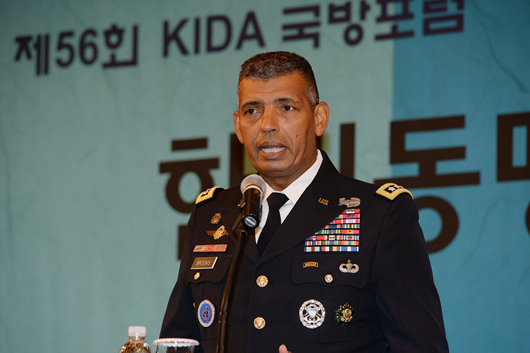S. Korea does not need extra missile defense: ex-US commander
By Choi Si-youngPublished : Nov. 3, 2020 - 15:00

South Korea would need no extra American anti-missile defense against North Korea because the existing ones would work in tandem with other missile networks in place, former US Forces Korea Commander Gen. Vincent Brooks told Radio Free Asia on Monday.
The retired general referred to the latest simulation test the US Missile Defense Agency conducted on Oct. 1, where a Patriot missile took down incoming fire using the Terminal High Altitude Area Defense radars.
Seoul maintains a missile defense network where the Patriot intercepts missiles flying at low altitudes and THAAD takes down threats at high altitudes. THAAD has much longer-range radars than the Patriot, so it can cue it to scan where the threat is suspected to appear in the sky and thwart hostile fire.
Experts agreed.
Michael Elleman, nonproliferation director at the International Institute for Strategic Studies, told RFA that the combination of the Patriot and THAAD would strengthen Seoul’s air defenses against Pyongyang.
But some experts have suggested the South bring in more THAAD systems for the North’s submarine-launched ballistic missile attack from the east coast.
Ankit Panda, a senior fellow at the Carnegie Endowment for International Peace, told RFA that Seoul should be prepared sideways because its current anti-missile defense counters hostile fire over the inter-Korean border.
He added that South Korea should not be discouraged by potential blowback from China when pressing ahead with the decision to mount a greater defense.
Seoul deployed its first THAAD battery in April 2017 and endured strong economic retaliation from Beijing, which said its powerful radars could penetrate its territory.
By Choi Si-young (siyoungchoi@heraldcorp.com)
The retired general referred to the latest simulation test the US Missile Defense Agency conducted on Oct. 1, where a Patriot missile took down incoming fire using the Terminal High Altitude Area Defense radars.
Seoul maintains a missile defense network where the Patriot intercepts missiles flying at low altitudes and THAAD takes down threats at high altitudes. THAAD has much longer-range radars than the Patriot, so it can cue it to scan where the threat is suspected to appear in the sky and thwart hostile fire.
Experts agreed.
Michael Elleman, nonproliferation director at the International Institute for Strategic Studies, told RFA that the combination of the Patriot and THAAD would strengthen Seoul’s air defenses against Pyongyang.
But some experts have suggested the South bring in more THAAD systems for the North’s submarine-launched ballistic missile attack from the east coast.
Ankit Panda, a senior fellow at the Carnegie Endowment for International Peace, told RFA that Seoul should be prepared sideways because its current anti-missile defense counters hostile fire over the inter-Korean border.
He added that South Korea should not be discouraged by potential blowback from China when pressing ahead with the decision to mount a greater defense.
Seoul deployed its first THAAD battery in April 2017 and endured strong economic retaliation from Beijing, which said its powerful radars could penetrate its territory.
By Choi Si-young (siyoungchoi@heraldcorp.com)









![[Today’s K-pop] BTS pop-up event to come to Seoul](http://res.heraldm.com/phpwas/restmb_idxmake.php?idx=644&simg=/content/image/2024/04/17/20240417050734_0.jpg&u=)
![[Graphic News] More Koreans say they plan long-distance trips this year](http://res.heraldm.com/phpwas/restmb_idxmake.php?idx=644&simg=/content/image/2024/04/17/20240417050828_0.gif&u=)







![[KH Explains] Hyundai's full hybrid edge to pay off amid slow transition to pure EVs](http://res.heraldm.com/phpwas/restmb_idxmake.php?idx=652&simg=/content/image/2024/04/18/20240418050645_0.jpg&u=20240419100350)

